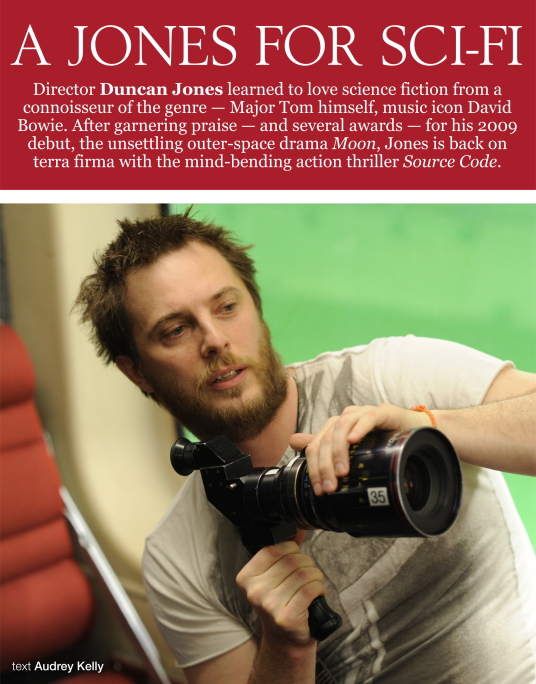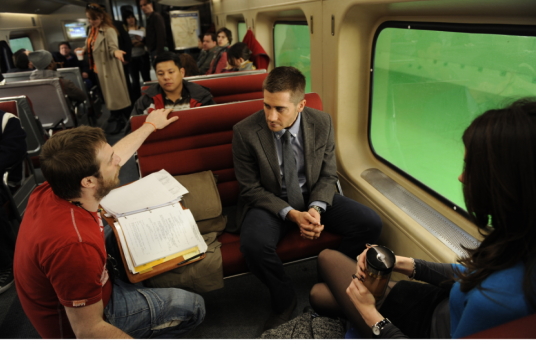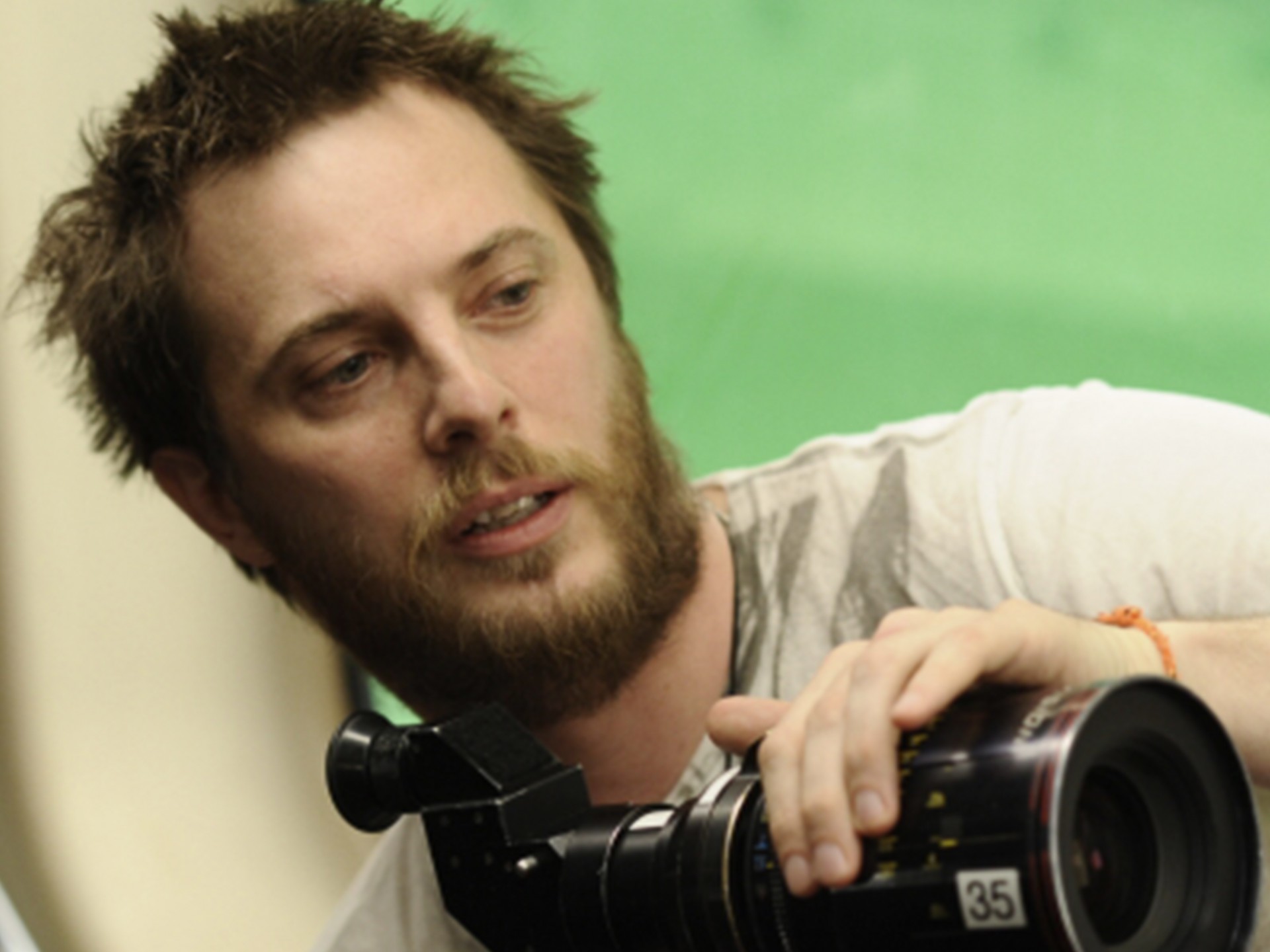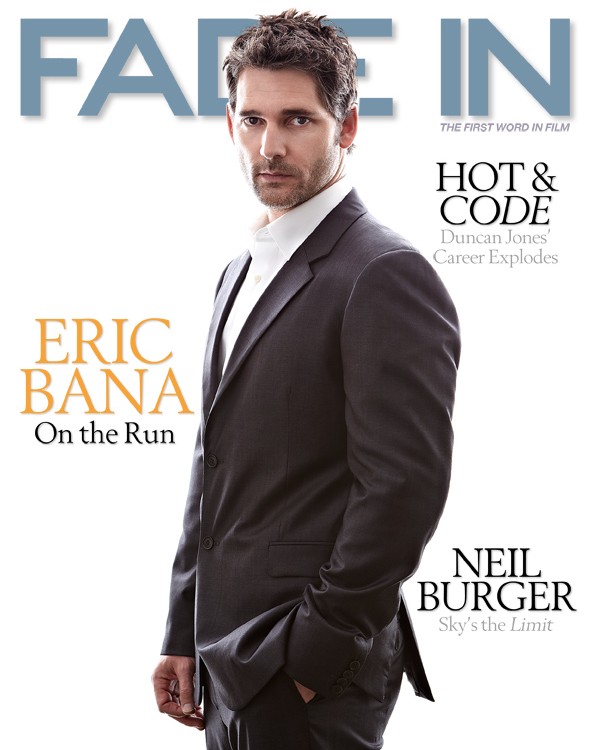 In Source Code, Jake Gyllenhaal is a soldier who tries to prevent a horrific event by reliving it several times in an eight-minute block of time. It must have been quite a puzzle to make the story work. What challenges, if any, did you run into during production? There were all sorts of things. It was really well written by Ben Ripley, who had been working on it for a long time, and he had managed to try out all sorts of ideas and then hone it back down to what really made it work and keep the pace in it. Because that’s what appealed to me so much — that it starts with a bang, and then it keeps on going and it maintains that speed and energy all the way through. The trick, obviously, is that you have to revisit this event in eight-minute segments that are going to be seen multiple times. As a director, it seems great on paper, but what you want to make sure is that the audience is not going to get bored with it. So I really had to address that, and break it down and work out how visually I was going to be able to revisit those eight minutes so that every time it felt completely different, and there were new things to look at, and new relationships, new characters to meet, and new events happening.
In Source Code, Jake Gyllenhaal is a soldier who tries to prevent a horrific event by reliving it several times in an eight-minute block of time. It must have been quite a puzzle to make the story work. What challenges, if any, did you run into during production? There were all sorts of things. It was really well written by Ben Ripley, who had been working on it for a long time, and he had managed to try out all sorts of ideas and then hone it back down to what really made it work and keep the pace in it. Because that’s what appealed to me so much — that it starts with a bang, and then it keeps on going and it maintains that speed and energy all the way through. The trick, obviously, is that you have to revisit this event in eight-minute segments that are going to be seen multiple times. As a director, it seems great on paper, but what you want to make sure is that the audience is not going to get bored with it. So I really had to address that, and break it down and work out how visually I was going to be able to revisit those eight minutes so that every time it felt completely different, and there were new things to look at, and new relationships, new characters to meet, and new events happening.
Did you watch other movies with lots of repetition, like Run Lola Run or Groundhog Day? Not in preparation for the film, but I’ve seen them and was aware of them. When you read the script, you can’t help but notice what previous films and TV shows that Source Code has built on top of. You’re walking on the shoulders of giants. There was one particular show, Quantum Leap, that I couldn’t help thinking of when I was reading the script. So where I could, I put my little homages. [Quantum Leap star] Scott Bakula actually came and did the voice of Jake’s father in the film.
Smart stunt casting. You seem drawn to the world of science fiction, with Moon, Source Code and other projects that have been bandied about with your name attached — Absolutely. I’m a big sci-fi fan, and I always have been. I know the next film I’m going to do will also be sci-fi, but then after that I’m going to take a break from that genre and there’s other films that I want to do that are very different.
Are sci-fi projects what you’re mostly offered? [Laughs] Off the back of Moon, the first run of scripts that I was offered were all pretty much about one guy alone in space. [Laughs] Eventually things started branching out a little, and then I had the chance to meet up with Jake. Jake is the one that introduced me to the Source Code script, and it really excited me. I can certainly see from his perspective how it might have felt it was keeping with Moon, but I felt nothing but the differences. I could see the scale of it, and the opportunity to do a film with a very different sense of urgency and excitement to it. It was a popcorn film, and I really liked that idea.
You’ve come a long way now since winning the BAFTA award for Outstanding Debut by a British Writer, Director or Producer, for Moon. How did things change for you after that? The BAFTA came at an incredibly opportune time for me. I was in the early stages of making Source Code. I was still at a stage where I was having to prove myself and trying to bring together a production staff and convince them that the way I wanted to make Source Code was the way that would be best for the film. They were going along, but I had to do a lot of convincing all the time. And the BAFTA was an amazing gift, timing-wise, because I was able to go and collect that award and it gave me a legitimacy at that point. So everyone was like, “You know, I think we do trust Duncan. We trust what he wants to do and what his vision is.” So it became much easier after that.
What’s the status of the U.K. Film Council and how have they helped you in your career? When we made Moon, we made it completely independently. So it was without real help from them, either. It was a seriously independent film.
“I feel like I’m behind, but I can accept it. I took a few big courses in life where I really allowed time to run past… I’m playing catch-up now, but I’m enjoying it. The things that I did in my past I don’t regret because they made me the person I am now. So I don’t think I would be able to do what I do now if I hadn’t spent those years being a little bit frustrated.”
 What advice do you give to commercial directors, as you were just a few years back, looking to break into features? I don’t know. I don’t know if I would give advice. You either know you want to make features, or you don’t. The only advice I would give is, if you don’t really deep down know that you want to make feature films, don’t try and go down that route. It’s such a different animal, and you have to have a real passion for wanting to work on really much longer formatted material. When I worked on a commercial, I don’t think I ever worked on anything longer than a couple of weeks — a month at most. And it’s a whole different world. You have to put your whole life on hold in order to spend a year and a half working on one project at the level of depth you’re going to have to get into it. Commercials are very different. It certainly takes some overlapping skills. But unless you want to be a features director, I don’t think you just try it out for the fun of it.
What advice do you give to commercial directors, as you were just a few years back, looking to break into features? I don’t know. I don’t know if I would give advice. You either know you want to make features, or you don’t. The only advice I would give is, if you don’t really deep down know that you want to make feature films, don’t try and go down that route. It’s such a different animal, and you have to have a real passion for wanting to work on really much longer formatted material. When I worked on a commercial, I don’t think I ever worked on anything longer than a couple of weeks — a month at most. And it’s a whole different world. You have to put your whole life on hold in order to spend a year and a half working on one project at the level of depth you’re going to have to get into it. Commercials are very different. It certainly takes some overlapping skills. But unless you want to be a features director, I don’t think you just try it out for the fun of it.
You’ve undoubtedly taken a lot of meetings in Hollywood now. Has there been anything about the film business that’s shocked you — about how business is done? I don’t know. Probably yes, but I have to be a little bit political on my answer to that.
No you don’t. [Laughs] The one thing that you always have to be very much aware of is that filmmaking in Hollywood, as it should be with the amount of money being spent, is a business. You have to be aware that the way people are thinking about movies may be different than the way I see a movie. The way I see a movie, it’s about the story I want to tell, or the excitement that I have about a specific actor that I want to work with or a visual that I want to do. But on the Hollywood side, there is always going to be the business angle, and you have to work out how to make that side — the artistic side of what I want to do — match up with the business side of making a film where someone can feel confident that they’re going to invest millions of dollars expecting to get that money back.
Did you know all of this coming from the commercial world? Maybe on the most superficial level. But the opportunity to actually take those meetings, and experience that, you really get a sense of how different people think and how movies get made. And it’s not a simple thing. There’s an awful lot of things that feed the equation.
How did your commercial background help you? It was a very different experience between Moon and Source Code. In some ways, Source Code was more reminiscent of doing a commercial than Moon was. On Moon, it was my producer, Stuart Fenegan, myself and Sam Rockwell. We’d all make the decisions, and sometimes we’d literally go off the grid if we felt we were doing something interesting, and it would work for the film. When you’re doing a bigger-budget film, and you’re working in a Hollywood system, you really have to spend an awful lot of time focused and finding ways to get where you want to go, and bring a large number of people with you, and explain what it is that you’re doing as you’re doing it. You also have more money, and that means you have a lot more responsibility, as well. That’s the key to it. The difference between an independent film and a Hollywood film is the difference between driving a speedboat and driving an oil tanker.
What are the positives and negatives of being a son of a cultural icon like David Bowie? Well, the positives were really nothing to do with that, other than he was interested in such an eclectic and interesting gamut of things that affected me when I was growing up. He was a fan of science fiction, so I became a fan of science fiction. He wanted to watch movies like 2001, A Clockwork Orange, and he introduced me to Animal Farm and all these amazing things. I had a dad who wanted to share them with me; that’s why I got to read and see them. That would be the benefit for anyone who has a parent who’s interested in that kind of subject matter and is supportive of their kids.
The drawback is what you’d expect. There are certain doors that get opened for you a little easier; there are certain doors that stay shut but for the same reasons. But basically, when you do get an opportunity to prove what you’re able to do, the expectations are very high. I understand that. I get it. The thing that I’ve always tried to do is to [maintain] my reputation and career based on what I do myself, without having to use his name like a battering ram. It takes longer than if I had done it the other way, but I feel confident that where I am now is because I worked hard at it.
So you saw a lot of films growing up? My dad tried to get me interested in music, but it wasn’t going to take. Film was the hobby that we both shared when I was a little kid.
What do you consider to be grossly overlooked films that influenced you and people should seek out? I guess since I’m known as a sci-fi guy, I’ll give one sci-fi film. It’s called Salute of the Jugger (a.k.a. The Blood Of Heroes) It was a Rutger Hauer film directed by the screenwriter David Peoples. Peoples was the writer of Blade Runner, Twelve Monkeys and a number of otherfantastic films. It’s not that it’s a brilliant film. It crystallized a lot of the things I loved about science fiction growing up…the sense of a believable, alternative world and good humor and action, as well.
“The way I see a movie, it’s about the story I want to tell, or the excitement that I have about a specific actor that I want to work with or a visual that I want to do. On the Hollywood side, there is always going to be the business angle, and you have to work out how to make the artistic side of what I want to do match up with the business side of making a film where someone can feel confident that they’re going to invest millions of dollars expecting to get that money back.”
 Why has Mute not come off yet, and what are the long-term prospects of getting it made? Mute we’ve been trying to make for such a long time, and I liken it to Terry Gilliam’s Don Quixote that he’d been trying to make for years. I have a feeling it may be a film that I try to make for the rest of my life. In the meantime, my producer and I have decided we are going to try and release it as a graphic novel. So right now we’re talking to companies to see if we can make a comic out of it, and then release it as a graphic novel. So that excites me, because there are so many people who’ve heard about this thing that I keep on talking about. [Now they] will finally get a chance to at least have an idea of what the film would be. And then, with any luck, maybe we’ll get the chance to make it one day.
Why has Mute not come off yet, and what are the long-term prospects of getting it made? Mute we’ve been trying to make for such a long time, and I liken it to Terry Gilliam’s Don Quixote that he’d been trying to make for years. I have a feeling it may be a film that I try to make for the rest of my life. In the meantime, my producer and I have decided we are going to try and release it as a graphic novel. So right now we’re talking to companies to see if we can make a comic out of it, and then release it as a graphic novel. So that excites me, because there are so many people who’ve heard about this thing that I keep on talking about. [Now they] will finally get a chance to at least have an idea of what the film would be. And then, with any luck, maybe we’ll get the chance to make it one day.
Speaking of graphic novels and comic books, have you amassed a fanboy base? [Laughs] I don’t know. Maybe. I’m on Twitter quite a lot. I have been for a very long time; just before Moon came out. I originally got on Twitter to help promote that film and help generate some interest. Since then, I’ve been on there fairly constantly. I’ve got a pretty good fan base on that. We have a laugh on there, and people are up to speed on what I’m doing via Twitter. I’m @ManMadeMoon.
Why did you pass on doing Judge Dredd? The main character is a compendium comic book called 2000 A.D. The comic was darker. The new script was very dark, and really interesting, but I have a very, very strong feeling about what I would want to do with a Judge Dredd movie. and as strong as the script was. it’s very different from my plan. I wish them all the best with it. I think it’s going to be a great film. but it wasn’t what I wanted to do with that character.
Do you really think it needs to be remade? I’m excited about the Judge Dredd film. The script was terrific. If they can keep to the mood and the atmosphere of the original comic book, they’ll do great. I don’t think it will be difficult for them to steer away from the Sylvester Stallone film. There is plenty of room for doing something different than that.
What type of material do you look for with your company, Liberty Films? That’s a tricky one. There’s a few books that we’ve looked into, and we’re slowly making our way to seeing if we can extricate them from the people who are sitting on them. But really my producer Stuart and I read what we can, and look for things, but on the whole, I like writing material myself. That’s my preference.
Even though it takes longer? That’s what I’m doing right now — writing a script. I wrote the original script for Moon, and then Nathan [Parker] and I bounced around back and forth doing drafts on that. My third film is going to be going back to that routine of coming up with an idea myself, which I’ve done, and now we’re working on the script for that.
It will be another science fiction film. Probably my last science fiction film for a while — I want to take a break from that genre after I’ve done this film. I’m very excited about it. Hopefully it’s going to put all of the things I’ve been working towards into one science fiction film. Moon was an independent film. Source Code was an opportunity to work in Hollywood on a bigger budget, and now, hopefully, I’m going to get to do a film that’s independent in that I wrote it myself, but I’ll do it [with] a bigger Hollywood budget.
Would you be open to directing Source Code 2? I would be thrilled to know the film was successful enough that they would want to do a Source Code 2.
You are turning forty this year. I know, I am.
Would you say you are you ahead, behind or just about where you thought you’d be at this stage in your life? Behind, but I can accept it. I took a few big courses in life where I really allowed time to run past where I really could have made some hay. I’m playing catch-up now, but I’m enjoying it. The things that I did in my past I don’t regret because they made me the person I am now. So I don’t think I would be able to do what I do now if I hadn’t spent those years being a little bit frustrated.
Do you believe in destiny? Maybe it was destined to happen for you now, and it’s as simple as that. Hmm. I don’t know. I’m not sure if I do. But I do think you can prepare the way for good luck. So as long as you work hard, and put yourself in the right position when good luck comes your way, you’re better able to make the best of it.




